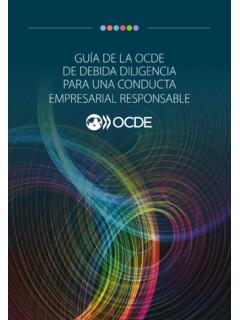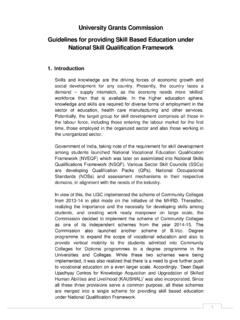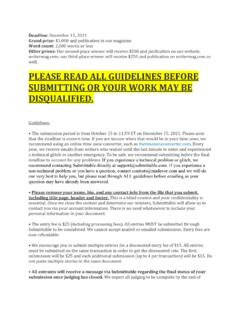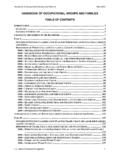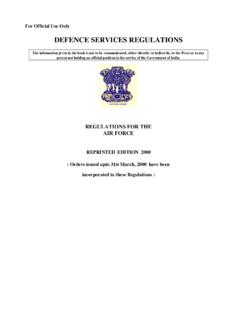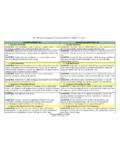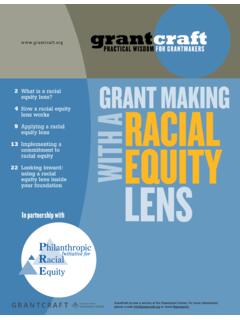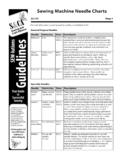Transcription of Monitoring and Evaluation Framework
1 Monitoring and Evaluation FrameworkOECD DUE DILIGENCE GUIDANCEFOR RESPONSIBLE SUPPLY CHAINS OF MINERALS FROM CONFLICT-AFFECTED AND HIGH-RISK AREASMONITORING AND Evaluation Framework OECD 2021 Co-funded by the European Union Photo credits: Luca Maiotti OECD 2021 This work is published under the responsibility of the Secretary-General of the OECD. The opinions expressed and arguments employed herein do not necessarily reflect the official views of the OECD or of the governments of its member countries or those of the European Union. This document and any map included herein are without prejudice to the status or sovereignty over any territory, to the delimitation of international frontiers and boundaries and to the name of any territory, city, or area.
2 Please cite this publication as: OECD (2021), Monitoring and Evaluation Framework : OECD Due Diligence Guidance for Responsible Supply Chains of Minerals from Conflict-Affected and High-Risk Areas | 3 Monitoring AND Evaluation Framework OECD 2021 Organisation for Economic Co-operation and Development (OECD) The OECD is a unique forum where governments work together to address the economic, social and environmental challenges of globalisation. The OECD is also at the forefront of efforts to understand and to help governments respond to new developments and concerns, such as corporate governance, the information economy and the challenges of an ageing population. The Organisation provides a setting where governments can compare policy experiences, seek answers to common problems, identify good practice and work to co-ordinate domestic and international policies.
3 The OECD s work on responsible business conduct (RBC) is delivered through the OECD Centre for Responsible Business Conduct (RBC Centre). The RBC Centre, which is part of the OECD Directorate for Financial and Enterprise Affairs, works with governments, business, workers and civil society to promote the implementation of the OECD Guidelines for Multinational Enterprises and related RBC standards. The OECD Due Diligence Guidance for Responsible Supply Chains of Minerals from Conflict-Affected and High-Risk Areas The OECD Due Diligence Guidance for Responsible Supply Chains of Minerals from Conflict-Affected and High-Risk Areas (hereinafter the DDG ) provides step-by-step recommendations endorsed by governments for globally responsible supply chains of minerals in order for companies to respect human rights and avoid contributing to conflict through their mineral or metal purchasing decisions and practices.
4 The OECD DDG may be used by any company potentially sourcing minerals or metals from conflict-affected and high-risk areas, and is intended to cultivate transparent, conflict-free supply chains and sustainable corporate engagement in the minerals sector. The OECD Council adopted the Recommendation on Due Diligence Guidance for Responsible Supply Chains of Minerals from Conflict-Affected and High-Risk Areas on 25 May 2011 based on a proposal from the Development Assistance Committee (DAC) and the Investment Committee. More information on the OECD s work in the mining sector can be found at: Notes on the Development of the Monitoring & Evaluation Framework The development of this Monitoring & Evaluation Framework (M&E Framework ) was premised on the OECD s terms of reference, which had involved extensive prior stakeholder input over a period of 18 months.
5 Further input and guidance was received by the OECD s Secretariat at each step of the M&E Framework s development. The M&E Framework was critiqued by an Informal Advisory Group of academic and civil society representatives. Leading theory was applied to the problem at hand, including systems theory, game theory, and literature specific to the problematic of minerals associated with conflict and adverse impacts. The basic characteristics of minerals markets were considered, as well as precedents involving the measurement of policy implementation. Upon being operationalised, the guiding specifications and parameters in the form of particular research methods and indicators were tested through example case studies, providing a perspective of how this M&E Framework is to be applied.
6 For this reason, several examples spanning indicators and data sources were drawn from experience implementing the DDG in the Democratic Republic of the Congo. These should be considered indicative as specific national and sub-national data sources will be considered for the deployment of the M&E Framework in selected countries. | 5 Monitoring AND Evaluation Framework OECD 2021 AcknowledgementsThis M&E Framework was prepared by Dr. Chris N. Bayer and Gerard van der Burg, representing Development International (DI) and IMPACT, respectively, under the direction of Luca Maiotti, Benjamin Katz, Hannah Koep-Andrieu and Tyler Gillard (OECD Centre for Responsible Business Conduct). Design and communications support were provided by Roxana Glavanov and Ariane Rota.
7 On behalf of DI, the Framework was critiqued by Dr. Derrill Watson (Tarleton State University), Dr. William Bertrand (Tulane University), Lawrence Heim (CCRcorp), Bryanna Frazier (DI), Jesse Hudson (DI), Juan Ignacio Iba ez (DI), and Eliana Gonzalez Torres (DI). For IMPACT, Joanne Lebert and Kady Seguin served as expert contributors, Carmen Teichgraber as the project manager, with c ontributions also made by Dr. Anthony Goerzen and Luke Fiske of Queen s University. The design of this M&E Framework was further critiqued by the ad-hoc Informal Advisory Group (IAG), comprising the following individuals: Catherine Anderson (OECD), Steven van Bockstael (University of Gent), Darin Christensen (University of California, Los Angeles), Dr.
8 Jose Diemel (Raw Resource Solutions), Perla Ibarlucea (OECD), Benjamin Krause (University of California, Berkeley), Jocelyn Kelly (Harvard University), Ken Matthysen (International Peace Information Service), Ben Miller (CDA Collaborative), Nene Morisho (Pole Institute), Josaphat Musamba (Center for Human Security Bukavu), Delphin Ntanyoma (Erasmus University), Dr. Dominic Parker (University of Wisconsin-Madison), Dr. Ben Radley (University of Bath), Dr. Martin Schleper (University of Sussex), Michal Shinwell (OECD), Dr. Nik Stoop (University of Antwerp), Dr. Marijke Verpoorten (University of Antwerp), Dr. Christoph Vogel (University of Zurich), and Michelle Westermann-Behaylo (University of Amsterdam). Further, the authors wish to thank the Multi-s takeholder Steering Group of the OECD Responsible Minerals Implementation Programme (MSG) as well as constituent organisations of MSG members, and in particular Olivier Bovet ( State Secretariat of Economic Affairs of Switzerland), Leah Butler (Responsible Minerals Initiative), Olivier Demierre (MKS PAMP GROUP), Guus Houttuin (E uropean External Action Service), Natalia Uribe (Alliance for Responsible Mining) and Annie Signorelli (Apple Inc.)
9 For their substantive feedback on the Framework draft. | 7 Monitoring AND Evaluation Framework OECD 2021 Table of contents Acronyms and Abbreviations 11 Overview 15 Notes 17 Glossary 19 Notes 22 1. Objectives and Development of the M&E Framework 23 M&E Framework Objectives 23 M&E Framework Development 23 2. OECD Due Diligence Guidance 25 Five steps of Due Diligence 25 3. Typology of peacebuilding interventions 29 Withdrawal of the resources for war 30 Economic action 31 Culture of peace 32 Notes 33 4. Theory of change 35 Assumptions 35 Framework 37 Hypotheses 43 Notes 47 5. The impact blueprint 49 Dimensions of Impact 49 Results Framework 50 6. M&E Framework 51 Monitoring vs. Evaluation 51 M&E Periodicity 54 Primary vs.
10 Secondary Data, Levels of Rigour 54 Attribution vs. Contribution 55 Identification of Data and Methodological Gaps 57 Notes 59 8 | Monitoring AND Evaluation Framework OECD 2021 7. Evaluation plan 61 Methods 61 Key Questions 61 Types of Data Consulted 62 Evaluation Sections 63 Evaluation Summary 87 Notes 92 8. Monitoring plan 93 Methods 93 Key Questions 93 Monitoring Summary 97 References 99 Tables Table Due Diligence Programme (DDP) criteria for M&E Framework studies 20 Table Classification of metals and relevant DDG supplement 27 Table Peacebuilding in settings of conflict and fragility common theories of change 29 Table Results dimensions and descriptions 50 Table Results Framework 50 Table Monitoring vs.




